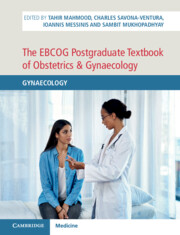Book contents
- The EBCOG Postgraduate Textbook of Obstetrics & Gynaecology
- The EBCOG Postgraduate Textbook of Obstetrics & Gynaecology
- Copyright page
- Dedication
- Contents
- Videos
- Contributors
- Preface
- Section 1 Basic Sciences in Gynaecology
- Section 2 Menstrual Disorders
- Section 3 Reproductive Endocrinology and Infertility
- Section 4 Contraception and STIs
- Section 5 Post-Reproductive Care
- Section 6 Vulva and Vagina
- Section 7 Cervix
- Section 8 Uterus
- Section 9 Ovary and Fallopian Tubes
- Section 10 Operative Gynaecology
- Section 11 Public Health Issues in Gynaecology
- Section 12 Miscellaneous
- Chapter 58 Prophylactic Bilateral Salpingo-oophorectomy
- Chapter 59 Immunotherapy for Gynaecological Cancers
- Chapter 60 Radiotherapy for Gynaecological Cancer
- Chapter 61 Clinical Audit and Risk Management in Gynaecology Practice
- Chapter 62 Research in Obstetrics and Gynaecology
- Chapter 63 Skills Training and Simulation
- Chapter 64 Practical Medical Education Science for Clinical Teaching Sites
- Chapter 65 Algorithm for Managing Vulvovaginal Symptoms
- Index
- Plate Section (PDF Only)
- References
Chapter 64 - Practical Medical Education Science for Clinical Teaching Sites
from Section 12 - Miscellaneous
Published online by Cambridge University Press: 24 November 2021
- The EBCOG Postgraduate Textbook of Obstetrics & Gynaecology
- The EBCOG Postgraduate Textbook of Obstetrics & Gynaecology
- Copyright page
- Dedication
- Contents
- Videos
- Contributors
- Preface
- Section 1 Basic Sciences in Gynaecology
- Section 2 Menstrual Disorders
- Section 3 Reproductive Endocrinology and Infertility
- Section 4 Contraception and STIs
- Section 5 Post-Reproductive Care
- Section 6 Vulva and Vagina
- Section 7 Cervix
- Section 8 Uterus
- Section 9 Ovary and Fallopian Tubes
- Section 10 Operative Gynaecology
- Section 11 Public Health Issues in Gynaecology
- Section 12 Miscellaneous
- Chapter 58 Prophylactic Bilateral Salpingo-oophorectomy
- Chapter 59 Immunotherapy for Gynaecological Cancers
- Chapter 60 Radiotherapy for Gynaecological Cancer
- Chapter 61 Clinical Audit and Risk Management in Gynaecology Practice
- Chapter 62 Research in Obstetrics and Gynaecology
- Chapter 63 Skills Training and Simulation
- Chapter 64 Practical Medical Education Science for Clinical Teaching Sites
- Chapter 65 Algorithm for Managing Vulvovaginal Symptoms
- Index
- Plate Section (PDF Only)
- References
Summary
Trainees in obstetrics and gynaecology are the future of women’s healthcare and they deserve optimal training. This chapter is a cookbook for a high-quality training site. Both trainees and faculty responsible for the training may benefit from reading it. An optimal training site is a co-creation between responsible faculty, trainees and the context in which the training is provided. When we speak to you in this chapter, we address both trainees and faculty. We hope you will enjoy this cookbook and that you will find the best recipe for your own training context.
Keywords
- Type
- Chapter
- Information
- The EBCOG Postgraduate Textbook of Obstetrics & GynaecologyGynaecology, pp. 539 - 543Publisher: Cambridge University PressPrint publication year: 2021

